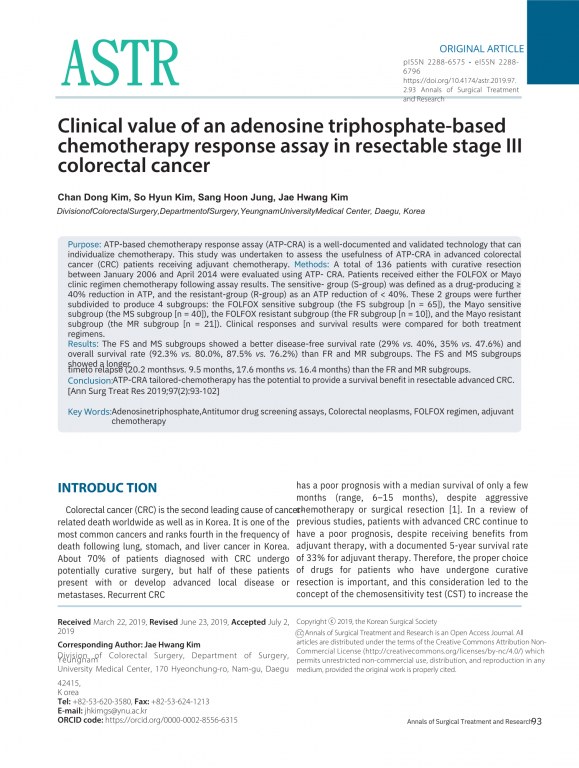Study Overview
This study evaluates the clinical efficacy of the ATP-based chemotherapy response assay (ATP-CRA) in personalizing adjuvant chemotherapy for patients with advanced colorectal cancer (CRC) following curative resection.
Ann Surg Treat Res. 2019 Aug;97(2):93-102. English.
Published online Jul 29, 2019. Authors: Chan Dong Kim, So Hyun Kim, Sang Hoon Jung, Jae Hwang Kim
https://doi.org/10.4174/astr.2019.97.2.93

This study evaluates the clinical efficacy of the ATP-based chemotherapy response assay (ATP-CRA) in personalizing adjuvant chemotherapy for patients with advanced colorectal cancer (CRC) following curative resection.
The study aimed to assess the utility of ATP-CRA in guiding adjuvant chemotherapy for advanced colorectal cancer (CRC) patients, enabling individualized treatment strategies.
A total of 136 patients who underwent curative resection between January 2006 and April 2014 were evaluated using ATP-CRA. Patients received either FOLFOX or Mayo Clinic regimen chemotherapy based on assay results. The sensitive group (S-group, ≥40% ATP reduction) and resistant group (R-group, <40% ATP reduction) were divided into four subgroups: FOLFOX sensitive (FS, n=65), Mayo sensitive (MS, n=40), FOLFOX resistant (FR, n=10), and Mayo resistant (MR, n=21). Clinical responses and survival outcomes were compared.
The FS and MS subgroups demonstrated superior disease-free survival rates (29% vs. 40%, 35% vs. 47.6%) and overall survival rates (92.3% vs. 80.0%, 87.5% vs. 76.2%) compared to the FR and MR subgroups. Time to relapse was longer in the FS and MS subgroups (20.2 months vs. 9.5 months, 17.6 months vs. 16.4 months).
ATP-CRA-tailored chemotherapy shows potential to enhance survival outcomes in patients with resectable advanced colorectal cancer.
Download the full study to explore the clinical impact of ATP-CRA in colorectal cancer treatment.